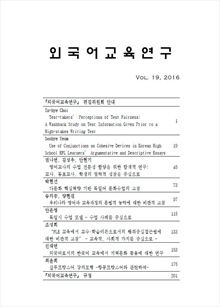간행물
외국어교육연구 Foreign Language Education Research

- 발행기관 서울대학교 외국어교육연구소
- 자료유형 학술지
- 간기 반년간
- ISSN 1229-5892 (Print)
- 수록기간 1998 ~ 2018
- 주제분류 사회과학 > 교육학 사회과학 분류의 다른 간행물
- 십진분류KDC 705DDC 405
권호리스트/논문검색
제10호 (2007년 12월) 6건
1.
2007.12
구독 인증기관 무료, 개인회원 유료
Although it is generally agreed that English education in Korea has improved grεatly since its beginning in 1983, there are still many important areas that have pε:rsistent problεms , and the proflεssion of English teaching is faced with some emerging issues. English education has progressεd both quantitatively and qualitatively, sincε English bεcarnε a required school subjεct in elementary school in 1997. The teachers’ and students‘ general English proficiεncy havε al50 improved. However, there arε still many teachers whosε English ability Iεavεs much to be dεSlfεd. Also, students’ losing confidence and interest in English is anothεr persistent problem. The society’s change also poses challenges to the English teaching profession This paper discusses these improvemεnts and pεrsistent problems and emεrging issues in English education in Korea
4,900원
2.
2007.12
구독 인증기관 무료, 개인회원 유료
This study aims to examine the effects of synchronous computer-mediated communication (CMC), asynchronous CMC and face-to-face communication on the psychological aspects of Korean EFL studεnts. The psychological aspects in question include ’willingness to communication’ and other affective variables, which prove to be conducive to conununication in English. For this purpose, the present study analyzed students' psychological aspects during text-chatting, posting on a bulletin board, and oral discussion and compared the gain scores frorn pre-πeatment and post-treatment questionnaires. The results revealed that face-to-face communication promoted students' psych이ogical aspects by providing a real context for direct interaction. 10 contrast, synchronous chatting did not enhance students' psychological aspects. This might be due to several problems in implementation. Asynchronous posting on a bulletin board did not have much effect on students' psychological aspects. Findings suggest that face-to-face communication can provide a more favorable environment for εncouraging positive psychological aspects toward English communication than the CMC modes. Pedagogical implications for the effective use of CMC are further discussed.
5,800원
3.
2007.12
구독 인증기관 무료, 개인회원 유료
This study aimεd to ìnvestigatε the relationship between phonemic awareness and listening comprehension ability. For this paπIC비ar research purpose thζ English name test and TOEFL LlC tests were employεd and a total of 34 university students participaκd in this εxpεriment. The English name tεst consisting of relativεly unheard 26 English namζs was specially dεsigned and adminisκrεd for the participants to depend on their own phonemic awarenεss ability, not applying their cognitive prior knowlεdge. whεn they transcribε:d the n잉nεs using the phonεtic alphabεts. Thε statistical result showed that thε Pearson's product-moment correlation coεfficient was .550* and its coefficient of determination was .303. This result c1ζarly demonstrated that the phonemic awareness ability was highly correlatεd with the overall Iistening comprεhension ability and implied thε need for implεmεnting the so-called bottom-up method for developing students' phonζrnic awareness ability at primary or secondary school levels.
4,000원
4.
2007.12
구독 인증기관 무료, 개인회원 유료
English εducation has becomε our national concern, but it cannot bε denied that this has caused the social problem of the English dividε In partic비 ar, the present public English education system sεems to be in a dilemma bεcause there is a largε gap bεtwζζn the goal of improvement of communicative competence in English and the reality of our schools. Thus, this paper discusses why we need to recognize thε role of English grammar education in thζ EFL situation as one of the ways to carry out more realistic and effective English education. It focuses on thε necessity of the combination of grammar with communication by reviewing the status of gr잉nmar education according to the various seconψforeign language ζducation theories and by consi~ering the problεms with communicative language teaching in our current educational situation. The concept of gramrnar has changed from the traditional one and the role and significance of gramrnar teaching are still being reevaluated. A dζsirable public education policy should bε εstablishεd on the basis of the real needs of 1εarners and the real situation of schools. To accomplish thε goals of effective English εducation , this papεr accordingly suggests that a new approach to gramrnar teaching bε irnplemented with political support through English education programs.
4,900원
5.
2007.12
구독 인증기관 무료, 개인회원 유료
5,700원
6.
2007.12
구독 인증기관 무료, 개인회원 유료
Quand on apprend une languε 하rangère , il est reconnu que le système de la languε matεmεIIε constitue toujours pour l'apprεnant de langue étrangère un P이ot de repère fondamental. Cela signifie que 10rs de 1’εnsεignement d’une languε étrangère, iI faut tenir compte de cε qui existe déjà chez 1’ appren때t, à savoir la langue matemelle, et y 5Upεrposer une nouvεIIε pratique et connaissances. Aussi, compte tεnu dε l’importance de la langue maκmelle , cette étudε consiste à proposer l'enseignεmεot de la grammaire française pour des apprenants coréens portant sur la contrastivité métalinguistiquε entre le français εt Iε coréen. Pour ce faire, notrε intérêt est centré sur les tεrmεs grammaticaux qUi ne constituent qu’une partie du rnétalangagε gramrnatical. En particulier, nous prεnons ici pour exernplε le complémζnt d’objet indirect qui est trζs révélateur de cεttε différence ζntre la terrninologiε grammaticale coréenne et cε11ε française. Ce qui va montrer la nécessité de tenir compte des différences métalinguistiques commençant par la terminologie grammaticale pour renouveler les descriptions grammaticales d헤 à existantes.
4,000원

